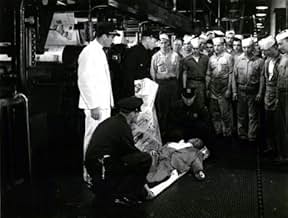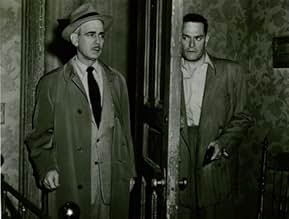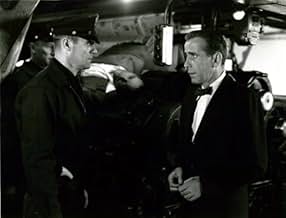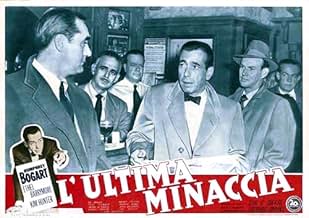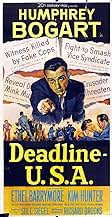VALUTAZIONE IMDb
7,2/10
4603
LA TUA VALUTAZIONE
Il direttore del quotidiano Day sa che la libertà di stampa è messa in pericolo ogni volta che una testata giornalistica giustamente critica rischia di venir assorbita da un gruppo editorial... Leggi tuttoIl direttore del quotidiano Day sa che la libertà di stampa è messa in pericolo ogni volta che una testata giornalistica giustamente critica rischia di venir assorbita da un gruppo editoriale con meno scrupoli.Il direttore del quotidiano Day sa che la libertà di stampa è messa in pericolo ogni volta che una testata giornalistica giustamente critica rischia di venir assorbita da un gruppo editoriale con meno scrupoli.
- Regia
- Sceneggiatura
- Star
- Premi
- 2 vittorie totali
Joe De Santis
- Herman Schmidt
- (as Joseph De Santis)
Parley Baer
- Headwaiter
- (non citato nei titoli originali)
Bill Baldwin
- Man Asking for Ed Hutcheson
- (non citato nei titoli originali)
Willis Bouchey
- Henry
- (non citato nei titoli originali)
Lovyss Bradley
- Woman
- (non citato nei titoli originali)
John Brooks
- Reporter
- (non citato nei titoli originali)
Ralph Brooks
- Newspaperman
- (non citato nei titoli originali)
Recensioni in evidenza
The 40's and 50's had quite a few movies in which newspapers and newspapermen were the central focus. There was "Scandal Sheet," "Ace in the Hole," "It Happened Tomorrow," "Foreign Correspondent," "His Girl Friday," this movie, and others. I suppose it makes sense considering print media was the largest and most influential form of media with television a decade or so away from becoming the ubiquitous medium it is now.
Ed Hutcheson (Humphrey Bogart) was the editor of The Day, a thriving New York newspaper. The owner and founder had just died and The Day was being sold by the wife and the two daughters. Ed was giving it his all trying to do what he could to prevent the sale as well as continue to print relevant news. He dedicated all of his staff and resources to looking into a local mobster named Tomas Rienzi (Martin Gabel) when one of his reporters was hospitalized for digging up too much information on the same gangster. He thought maybe, just maybe, this story would both: expose a criminal and save the paper.
This was an ideologue movie. There were two stories running parallel to each other. One was the story of the gangster and his outsized influence, the other was the newspaper being sold to a competitor who was going to shutter it. The gangster story was a thrilling one, but the paper being sold was a principled one.
If The Day was sold to a competitor and then closed down, that would be one less voice for the people. It would be one less viewpoint, one less source of news, and one less competitor for the other papers. Such a thing couldn't be good for the reader and the average citizen. Market competition has always benefited the consumer (even though it's not benefiting us much nowadays with gas prices) while monopolies have always harmed the consumer.
This was a pivotal issue with The Day being sold, but it also directly confronted a person's or business's capitalistic right to sell their property. Should the courts prevent this sale based upon it taking away a source of news from your average citizen, what other sales would the courts be allowed to, or have to prevent? It was a novel argument that played out on screen and gave the viewer food for thought.
Free on YouTube.
Ed Hutcheson (Humphrey Bogart) was the editor of The Day, a thriving New York newspaper. The owner and founder had just died and The Day was being sold by the wife and the two daughters. Ed was giving it his all trying to do what he could to prevent the sale as well as continue to print relevant news. He dedicated all of his staff and resources to looking into a local mobster named Tomas Rienzi (Martin Gabel) when one of his reporters was hospitalized for digging up too much information on the same gangster. He thought maybe, just maybe, this story would both: expose a criminal and save the paper.
This was an ideologue movie. There were two stories running parallel to each other. One was the story of the gangster and his outsized influence, the other was the newspaper being sold to a competitor who was going to shutter it. The gangster story was a thrilling one, but the paper being sold was a principled one.
If The Day was sold to a competitor and then closed down, that would be one less voice for the people. It would be one less viewpoint, one less source of news, and one less competitor for the other papers. Such a thing couldn't be good for the reader and the average citizen. Market competition has always benefited the consumer (even though it's not benefiting us much nowadays with gas prices) while monopolies have always harmed the consumer.
This was a pivotal issue with The Day being sold, but it also directly confronted a person's or business's capitalistic right to sell their property. Should the courts prevent this sale based upon it taking away a source of news from your average citizen, what other sales would the courts be allowed to, or have to prevent? It was a novel argument that played out on screen and gave the viewer food for thought.
Free on YouTube.
The film opens with a businessman being questioned in a courtoom, similar to the House Un-American Committee This newspaper may be sold, right in the middle of the biggest news story of the year. Stars Bogart as the editor, and Ethel Barrymore as Mrs. Garrison, the owner. and Jim Backus (Mr. Howell, from Gilligan's Island) is in here. Bogart tries to convince Mrs. Garrison to keep the paper going, but its an uphill battle. Not a lot of votes on imdb for this one, so TCM must not show it very often. Touching scene, where the reporters all hold a memorial for the paper in the bar.... even more prescient today, when there are very few papers left, and those few are an endangered species. Some similarites to Citizen Kane, where the respectable paper can't compete with the yellow, sensational papers for circulation. Written and directed by Richard Brooks, who was married to Jean Simmons. Pretty good stuff. I had never seen this one before. It really strikes a nerve today, with the interwebs really killing off newspapers.
"It's not our job to prove he's guilty. We're not detectives and we're not in the crusading business." That line from Humphrey Bogart early in the film lets you know you're watching a movie about a bygone era in journalism. Or maybe that's just an idealized fantasy and reporters were never like that, because later in the film Bogart contradicts himself by instructing his reporters to "go below the belt" and "we're gonna convict him of every crime on the books." Feelings on journalistic philosophy aside, this is an exceptional crime drama about the goings-on at a newspaper that's going out of business. Before the doors are closed, editor Bogart and his reporters try to uncover the truth about a racketeer's criminal activities.
Bogart turns in one of his finest acting turns, with terrific support from Ethel Barrymore, Martin Gabel, Ed Begley, Kim Hunter, Warren Stevens, Jim Backus, and many more. The story moves along at a smooth pace and keeps your interest throughout. There's quite a bit of monologuing but the script is packed with punch and grit. It's one of the better films in writer & director Richard Brook's career. It's worth a look on its merits as a dramatic film, as well as the added historic value it has for those looking to examine the differences and similarities between how journalism was viewed yesterday versus today.
Bogart turns in one of his finest acting turns, with terrific support from Ethel Barrymore, Martin Gabel, Ed Begley, Kim Hunter, Warren Stevens, Jim Backus, and many more. The story moves along at a smooth pace and keeps your interest throughout. There's quite a bit of monologuing but the script is packed with punch and grit. It's one of the better films in writer & director Richard Brook's career. It's worth a look on its merits as a dramatic film, as well as the added historic value it has for those looking to examine the differences and similarities between how journalism was viewed yesterday versus today.
This film was released (as I remember) the same year as The African Queen. I have always liked it more than the latter film. Richard Brooks's prior experience working on a newspaper gives it a genuine idea of what that kind of work is like. The performances of Bogart and Barrymore are very good. I think it's one of her very best. This movie deserves to be seen and appreciated more.
I don't know if it was intended to copy the fast-paced press room and gangster films that Warner Brothers did in the 1930's, but you certainly get a chance to see what Bogart could have done had he been a star at Warner Brothers during the 30's rather than largely a supporting player. Of course, everything here is taking place in present day - 1952 - but not only does the film reach backwards for its brisk pace, it reaches forward into the 21st century with some of its subject matter. In particular, there is the subject of how big companies buy smaller more effective companies to eliminate the competition, and the subject of inherited wealth and how the companies that formed that wealth are often not appreciated by the spoiled children-heirs.
Here Bogart plays the editor in chief of crusading hard-hitting daily newspaper "The Day", which is about to be sold off by the bored children of the deceased founder. The founder's widow (Ethel Barrymore) unfortunately is outvoted by her ungrateful children, and with the encouragement of Bogart's character tries to come up with enough money to buy her children's shares back from her daughters. In parallel with this is the story of The Day trying to break one last big story before they are bought out - a story that will break the power of a local crime boss who is not taking his possible downfall lying down.
This one is seldom seen and very well done, and I highly recommend that you see it if it ever comes your way.
Here Bogart plays the editor in chief of crusading hard-hitting daily newspaper "The Day", which is about to be sold off by the bored children of the deceased founder. The founder's widow (Ethel Barrymore) unfortunately is outvoted by her ungrateful children, and with the encouragement of Bogart's character tries to come up with enough money to buy her children's shares back from her daughters. In parallel with this is the story of The Day trying to break one last big story before they are bought out - a story that will break the power of a local crime boss who is not taking his possible downfall lying down.
This one is seldom seen and very well done, and I highly recommend that you see it if it ever comes your way.
Lo sapevi?
- QuizOriginally titled 'The Newspaper Story', location shooting took place both in the newsroom and the printing plant of The New York Daily News, with real pressmen playing themselves. This was augmented by an 'almost letter-perfect' reproduction of a newsroom on a Hollywood soundstage.
- BlooperAs Rienzi's car drives off after picking up Hutcheson, a large studio light is reflected against the side window of the car.
- Citazioni
[last lines]
Ed Hutcheson: That's the press, baby. The press! And there's nothing you can do about it. Nothing!
- ConnessioniFeatured in L'unico gioco in città (1970)
- Colonne sonoreJohn Brown's Body
(uncredited)
Traditional tune, lyrics attributed to various writers
Sung, with modified lyrics, by the staff in the bar and heard as a theme at other times.
I più visti
Accedi per valutare e creare un elenco di titoli salvati per ottenere consigli personalizzati
- How long is Deadline - U.S.A.?Powered by Alexa
Dettagli
Botteghino
- Lordo in tutto il mondo
- 5228 USD
- Tempo di esecuzione1 ora 27 minuti
- Colore
- Proporzioni
- 1.37 : 1
Contribuisci a questa pagina
Suggerisci una modifica o aggiungi i contenuti mancanti

Divario superiore
By what name was L'ultima minaccia (1952) officially released in India in English?
Rispondi

